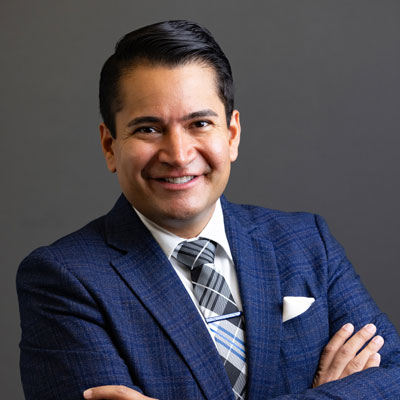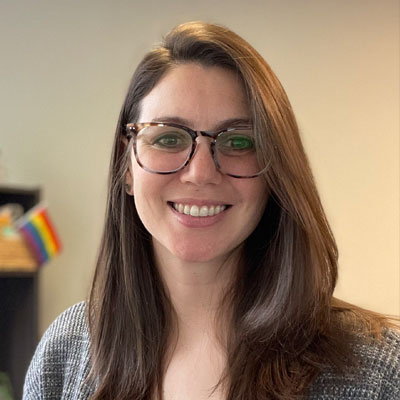For decades, Crain’s Cleveland Business has recognized young leaders making impacts across their communities in Northeast Ohio and beyond. This year’s “40 Under 40” publication, released Nov. 18, included two familiar faces from Case Western Reserve University: those of staff member Jason Buitrago and faculty member Christine Duval.
As members of the publication’s “40 Under 40” Class of 2024, Buitrago, executive director of enrollment management and strategic initiatives at Case Western Reserve University School of Medicine, and Duval, an associate professor in the Department of Chemical and Biomolecular Engineering, are celebrated for their exceptional achievements to drive change forward.
Read on to learn more about the honorees from CWRU.
Inspiring tomorrow’s leaders

No matter the setting, Jason Buitrago, 39, is well-known for his “can-do” attitude. The mindset is what drove the Brooklyn native to become first in his family to pursue higher education outside of New York City—a decision that shaped the course of his career.
After turning to the offices of admissions and financial aid for support as an undergraduate student at the University of Rochester, Buitrago found work as a student employee as well as a front row seat to how admission decisions were made. The experience revealed a passion for relationship-building, which he views as the core component of enrollment management.
Buitrago set out to master the skill. After 16 years of experience with his alma mater, he joined Case Western Reserve University School of Medicine in 2019 to lead recruitment for the school’s doctoral, master’s and certificate programs. It didn’t take long for him to build a reputation across CWRU as an inclusive, thoughtful leader.
For as central as relationship-building is to Buitrago’s approach, he places an even stronger focus on inclusivity—a perspective largely informed by his experience as the son of Colombian immigrants. This “pay it forward” mentality is part of what inspired him to launch Case Western Reserve’s chapter of the Society for the Advancement of Chicanos/Hispanics and Native Americans in Science. Buitrago also was recently named to the 100+ Latinos Cleveland Must Know 2024 cohort by AmMore Consulting.
“Jason’s enthusiasm for his job is infectious and he is deeply committed to helping students find their pathway, even if it doesn’t lead to CWRU,” wrote one nominator for this recognition. “He is the consummate matchmaker.”
Speaking with the Crain’s editorial staff, Butraigo shared: “I think the part that still gives me incredible satisfaction in my role is those moments when prospective students feel connected. Where they say, ‘Oh, my goodness, there’s possibility here.’”
Off campus, Buitrago seeks to empower those throughout the various communities to which he belongs. He holds a bachelor’s in mathematics and master’s in higher education administration from the University of Rochester, and is working toward a PhD in higher education administration.
Engineering positive change

When the editorial staff at Crain’s asked Christine Duval, 35, to comment on what’s helped her forge such a successful career, the chemical engineer’s answer was simple: “I made a conscious decision to work on projects that can benefit humanity.”
In her seven years at Case School of Engineering, she’s done just that, focusing her research on improving healthcare and positively influencing the environment. Duval develops new ways to tackle these issues through membrane separation—in other words, constructing filters that remove dangerous substances from chemical mixtures.
Her efforts have gained national support. Backed by a prestigious Early Career Research Grant from the U.S. Department of Energy, Duval’s research team is working with Actinium-225, an isotope that has the power to kill cancer cells without harming healthy tissue but also a notoriously short shelf life. By focusing on dramatically shortening the isotope’s purification time, Duval and her colleagues are making it possible for more patients to receive life-saving treatments.
Her team’s efforts are also driving environmentally safe methods to separate so-called “rare-earth elements” used for wind turbines, electric vehicles and smart phones. Duval landed the National Science Foundation’s prestigious Faculty Early Career Development Program (CAREER) award in support of this work.
For as robust as her research interests are, her primary passion falls closer to home: mentoring the next generation of engineers. It’s a commitment that’s earned her numerous teaching and mentoring awards, including the university’s coveted John S. Diekhoff Award for Excellence in Graduate Teaching and Mentoring.
Off campus, Duval is a member of the board of directors for the North American Membrane Society and a steering committee member for the World Association of Membranes Society. She holds a PhD in chemical engineering from Clemson University and a bachelor’s in the field from the University of Connecticut.
